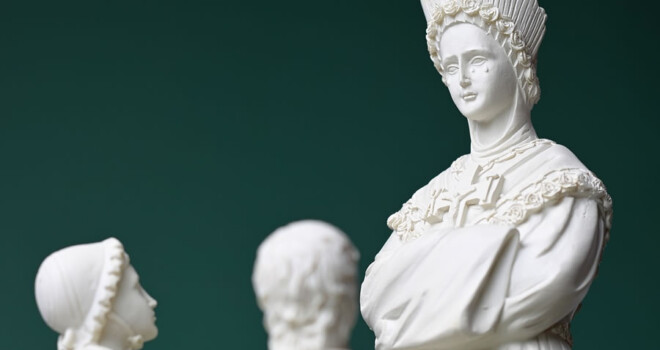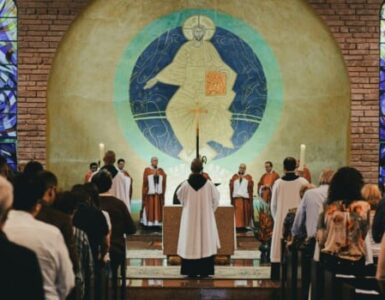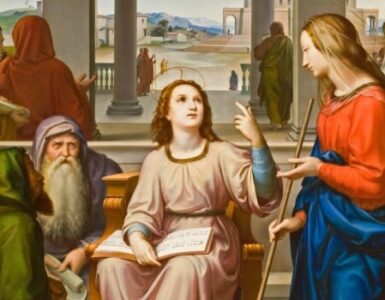I very much enjoyed Suellen Brewster’s two-part presentation on the message of La Salette. It may be of interest to Catholic Exchange readers to become acquainted with what the eminent Catholic philosopher, Jacques Maritain, had to say about the Apparition. The source of my postscript is Maritain’s Notebooks.
Maritain and his wife, Raissa, had been greatly moved by the Apparition. As Jacques writes:
But before all and above all, the mystery which struck the heart and which one will never finish scrutinizing, is that of the tears shed by Her whom all generations must call blessed, the mystery of the suffering manifested by the incomparably glorious Theotokos, weeping before two shepherds over the hard-heartedness of men and announcing great misfortunes.
When Maritain reflected on Mary’s words, “you will make this known to all my people,” he decided to apply his intelligence and artistry to write a treatise to do his part in making the message of La Salette better known to the world. At that time, in 1915, the majority of the faithful were ignorant of the Apparition. What was more disconcerting was a marked hostility toward Mélanie, the shepherdess who, with Maximin, had witnessed the Apparition.
Maritain set before himself the task of writing about La Salette in its entirety in as objective a manner as possible and serve nothing other than the truth. He recognized that the testimony of Mélanie was most important, he began to gather the observations and memories of those who had known her well. He consulted with one priest with whom Mélanie stayed twice for a few days, and another priest with whom she lived for several months and was her confessor during this time. Both priests had been her friends and held her in great veneration. But his research did not stop there. Suffice to say that he gathered enough information to write a treatise of considerable size.
Being a man of exceptional humility and a devoted Catholic, Maritain sought the opinion of Pére Garrigou-Lagrange, himself a renowned philosopher and theologian. Maritain did not want anything of his own published without the unreserved approval of the Church. Father Garrigou-Lagrange was happy with the manuscript and said to its author, “The Blessed Virgin loves you very much. You will suffer much.” Then he advised him to consult with the pope.
Pope Benedict XV received Jacques and his wife with much kindness and listened attentively to Maritain’s response to La Salette. He was convinced that the apparition was authentic but wondered whether Mélanie’s words should be taken literally. He cited her youthfulness and that her imagination might have been a factor in what she said. Furthermore, the pope was concerned about avoiding a scandal, for Mary had severe things to say about certain members of the clergy. He was worried about Catholics turning away from their priests. Although at certain moments scandal is preferable, he agreed, it did not seem to be the case here.
The pope then asked Maritain if the young philosopher believed that Mélanie’s words should be taken literally. At this point, Maritain experienced a dilemma: should he contradict Benedict XV or the Blessed Virgin? “Better to displease the pope,” he wrote in his notebook. “Yes, Most Holy Father, I believe that Mélanie was a saint and that what she reported is literally true. I had many details concerning her life. She as a stigmatist. She suffered much by fidelity to her mission.” “The tears,” Raissa added, “correspond well to the state of the world.” The pope remained silent. He appeared to be touched. Then, he said, “Here is what you must do, Go see Our Brother … Cardinal Billot. He is in charge of studies, it is quite a natural introduction for you.”
The Cardinal received Maritain most graciously, though he was a bit taken back by the “frightfully large manuscript.” He promised to read it over the next two months and send his reply through Jacques Froissart. “You have proceeded properly,” the cardinal said, and then gave Maritain his blessing.
The reply was negative. Nothing objectionable was stated concerning the manuscript, but its publication was judged to be decidedly “inopportune.” Authorization for publication was, thus, refused. “The only thing to do was to obey,” Maritain wrote in his Notebooks, “as I was prepared to do from the beginning. I had done all that I could do for La Salette; to understand this piece of work had been an obligation for me of conscience.”
Maritain’s voluminous work was never published, and he left word that it should never be published after his death. He accepted the refusal without a trace of bitterness. In fact, he felt gratitude: “I thanked Providence for having caused it to reach, by paths which I would never have been able to foresee, persons in whose hands it was doubtless most important that it be placed.”
Indeed, Mary has not forgotten La Salette. The grace from the Apparition continues to cascade upon its disciples. The Missionaries of Our Lady of La Salette, founded in 1852, is a religious congregation consisting of priests and brothers. There is also a parallel religious community of sisters called “The Missionary Sisters of Our Lady of La Salette.” Their combined work has spread to North and South America, Europe, Asia, Australia, and Africa. The national shrine to Our Lady of La Salette is in Attleboro, Massachusetts. There are also shrines in Enfield and New Hampshire, as well as in Portugal, Mexico, and India. “La Salette Reflections” is a monthly online magazine.
As for the visionaries, Maximin Giraud died a holy death on March 1, 1875, in his native village of Corps, France; Mélanie Calvat died as a Cathoic nun on December 15, 1904, in Altamura, Italy.
Photo from Saint Clare of Assisi














